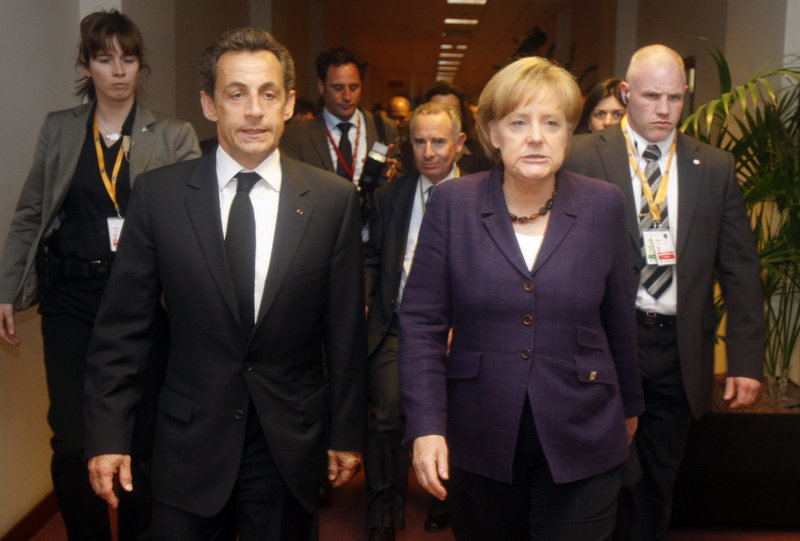BRUSSELS – European leaders have agreed on a series of strong steps to stamp out the spiralling debt crisis, including consolidating public finances, bringing in the European Central Bank to ensure eurozone stability and possibly set up a European mechanism to preserve financial stability and prevent future crises like the one that has engulfed Greece.
The draft document still must receive final approval at an emergency summit that ran into early today and came amid signs the contagion was spreading across Europe and beyond. However, there is little political will for more direct money for other indebted countries.
“Consolidation of public finances is a priority for all of us, and we will take all measures needed to meet our fiscal targets this year and the years ahead in line with excessive deficit procedures,” the draft said, adding that all member states “fully support the ECB in its actions to ensure the stability of the euro area.”
The draft also said that the EU would “propose a European stabilization mechanism to preserve financial stability in Europe.”
Several leaders at Friday’s meeting want to impose punishing budgetary rules that would force member nations walk a tight budgetary line and avoid the kind of cheating and overspending which led to Greece’s problems.
Several leaders, including French President Nicolas Sarkozy and Chancellor Angela Merkel, insisted Greece and subsequent market moves targeting other eurozone nations had left the whole framework of rules managing the euro in crisis and needed to be firmed up, according to officials close to the talks.
To deal with the crisis, some also wanted a deeper involvement of the European Central Bank.
“We must sharpen the edge” of the rules to keep wayward governments in line, Merkel said, adding the 16 euro-zone leaders should also consider changes to the 1992 treaty that laid the groundwork for the shared currency. “Otherwise, it won’t work, in my opinion.”
Opening an evening summit among visibly tense dinner partners, Sarkozy and European Commission President Jose Manuel Barroso insisted the crisis now had gone beyond Greece itself and affected the very roots of the currency. The summit was way behind schedule as the leaders continued to debate behind closed doors.
Canadian Finance Minister Jim Flaherty chaired a G-7 telephone conference of finance minister and central bankers on the Greek debt situation and he urged European countries to move quickly with a strong response.
“The sooner the better,” said Flaherty, who declined to talk about the details of the talks. He said discussions are continuing and he expects there will be further discussion this weekend.
“Every one understands the need for a clear, timely and strong response,” Flaherty said.
The euro has rules to stop governments from undermining it with reckless spending, limiting deficits to 3 percent of gross domestic product. Those rules were shown to lack teeth when even big countries such as Germany and France broke them for years without serious consequences.
Merkel spoke ahead of an evening summit of the euro countries. Earlier, Sarkozy and Barroso huddled with EU President Herman Van Rompuy to assess the financial fallout of the past days, which has financial markets testing the euro’s robustness.
Merkel, whose country holds the key to any solution, spoke Friday with President Obama, who said he supported the effort to deal with the financial crisis in Europe.
The summit, originally called to sign off on the bailout and draw lessons for the future, turned into one of crisis management. Markets have continued to sell off the euro and Greek bonds even as EU leaders have insisted for days the Greek financial implosion is a unique combination of bad management, free spending and statistical cheating that doesn’t apply to other eurozone nations, such as troubled Spain or Portugal.
They said the bailout should keep the problem from spreading to other countries by giving Greece three years of support and preventing a default when it has to pay euro8.5 billion in bonds coming due May 19.
“We are determined to move forward. But there is unprecedented volatility throughout the world, in the world economy,” said Greek Prime Minister George Papandreou.
“That is why today’s meeting here in Brussels is so important. We will reaffirm our confidence in our economies, in our common currency. And this I believe is a very important message for the global economic recovery.”
The markets have taken little heed of leader’s reassurances. Stocks, Greek bonds and the euro plunged even after the head of the European Central Bank, Jean-Claude Trichet, tersely underlined that “Portugal is not Greece. Spain is not Greece” on Thursday.
The euro fell to $1.2520, its lowest in 14 months, but recovered to $1.2721 later.
Send questions/comments to the editors.



Success. Please wait for the page to reload. If the page does not reload within 5 seconds, please refresh the page.
Enter your email and password to access comments.
Hi, to comment on stories you must . This profile is in addition to your subscription and website login.
Already have a commenting profile? .
Invalid username/password.
Please check your email to confirm and complete your registration.
Only subscribers are eligible to post comments. Please subscribe or login first for digital access. Here’s why.
Use the form below to reset your password. When you've submitted your account email, we will send an email with a reset code.